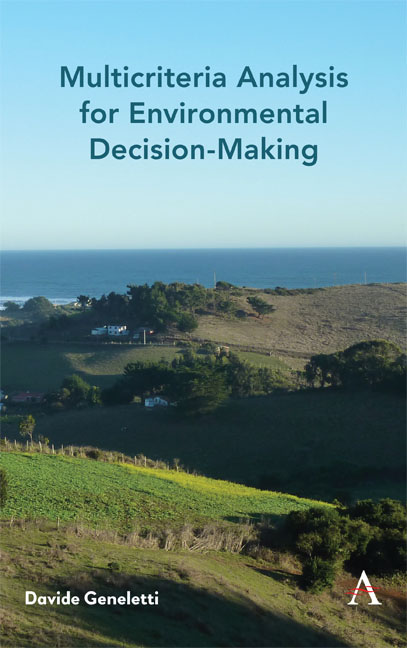Book contents
- Frontmatter
- Contents
- List of Figures
- List of Tables
- Acknowledgements
- List of Author and Contributors
- Introduction
- 1 Principles of Multicriteria Analysis
- 2 A Review of MCA Applications for Nature Conservation
- 3 Landfill Site Selection: Combining Spatial MCA with Stakeholder Analysis
- 4 Protected Area Zoning: Integrating Spatial MCA and Multi-objective Evaluation
- 5 Forest Landscape Restoration: Applying MCA to Design and Compare Options
- 6 Impact Assessment of Ski Areas: Combining GIS Indicators with MCA
- Conclusions
- Annex
- References
- Index
- Frontmatter
- Contents
- List of Figures
- List of Tables
- Acknowledgements
- List of Author and Contributors
- Introduction
- 1 Principles of Multicriteria Analysis
- 2 A Review of MCA Applications for Nature Conservation
- 3 Landfill Site Selection: Combining Spatial MCA with Stakeholder Analysis
- 4 Protected Area Zoning: Integrating Spatial MCA and Multi-objective Evaluation
- 5 Forest Landscape Restoration: Applying MCA to Design and Compare Options
- 6 Impact Assessment of Ski Areas: Combining GIS Indicators with MCA
- Conclusions
- Annex
- References
- Index
Summary
The chapters of this book illustrated how MCA can promote a logical and well-structured decision-making process, overcoming informal judgements and decisions unsupported by analysis. For example, the case study on protected area zoning (Chapter 4) described how a complex problem can be broken down into smaller pieces, which are first addressed through separate MCA, and then combined. Similarly, the case study on forest landscape restoration (Chapter 5) adopted a stepwise approach to first apply MCA to narrow down the problem to a set of possible solutions, and then compare them through additional, and more specific, criteria. MCA helps also to combine factual information (e.g. results of the impact modelling) with value-based information (e.g. stakeholders’ views) in an explicit way. The case study in landfill site selection (Chapter 3) illustrated the role of these two types of information throughout the decision-making process: from the first screening of suitable areas, to the comparison and ranking of possible sites.
MCA can contribute to make environmental policy and management decisions more transparent and justified, by improving problem structuring, exploring the view of the stakeholders and enhancing their understanding of the problems and the issues at stake (Kiker et al. 2005). As Gamper and Turcanu (2007) put it: ‘All in all, the added value of MCA for public decision making clearly lies in its ability to reveal preferences, in a more direct and practical way than other decision-support tools.’ Nevertheless, MCA is sometimes perceived as a technocratic approach, and identified with the computation undertaken to combine criteria scores and produce a ranking of alternatives. However, this is a narrow interpretation of MCA, as the methodological insights and case studies presented in this book showed. Uncovering, and exploiting, the full potential of MCA to support decisionmaking requires a broad understanding of decision processes, the knowledge of other methods and tools that can be combined with MCA and appropriate skills and resources, as described next.
Any assessment that involves multiple criteria and objectives inherently requires some form of weight assignment. This is often the most controversial and disputed part of the analysis, but it is also the moment that offers the greatest potential for stakeholder engagement and public participation in a way that is meaningful and influential.
- Type
- Chapter
- Information
- Multicriteria Analysis for Environmental Decision-Making , pp. 97 - 100Publisher: Anthem PressPrint publication year: 2019



